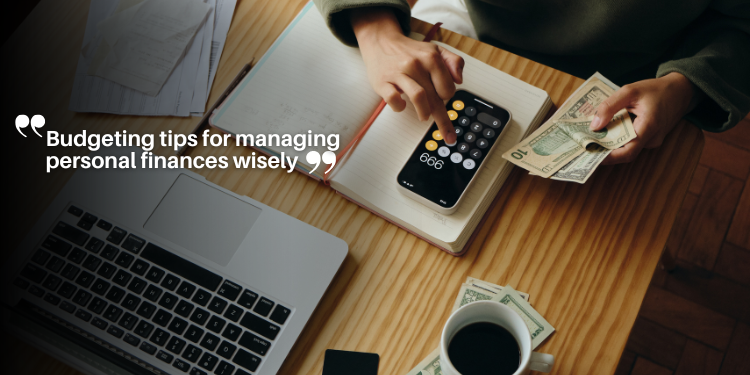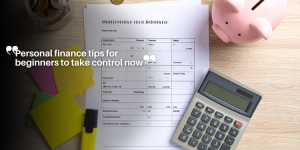Budgeting tips for managing personal finances wisely

Budgeting tips for managing personal finances include tracking expenses, setting realistic financial goals using the SMART criteria, utilizing budgeting apps, and adapting your budget to changing circumstances.
Budgeting tips for managing personal finances are essential in helping you take charge of your money. Have you ever felt overwhelmed by your expenses? Understanding how to budget properly can truly transform your financial situation.
Understanding the importance of budgeting
Understanding the importance of budgeting is crucial for anyone looking to gain control over their finances. A well-planned budget doesn’t just track spending; it guides you towards achieving your financial goals. By outlining your income and expenses, you can identify areas to save more and spend less.
Why Budgeting Matters
Budgeting helps you prioritize your needs over wants. When you know what your mandatory expenses are, like rent and utilities, you can allocate funds wisely. This awareness can lead to positive financial outcomes, such as building an emergency fund or saving for a vacation.
- Improves financial awareness
- Reduces unnecessary expenses
- Facilitates goal setting
- Provides peace of mind
Moreover, budgeting is a proactive approach to managing your money. It allows you to respond to unexpected financial challenges effectively. By having a budget in place, you can make informed decisions rather than reactive ones.
Personal Accountability
Having a budget also promotes personal accountability. When you allocate funds for different categories, you hold yourself responsible for sticking to them. This sense of responsibility fosters discipline.
Ultimately, understanding budgeting can transform your financial situation. It empowers you to make better financial choices and leads to long-term financial success. Embrace budgeting not just as a task, but as a strategy to achieve financial freedom.
Setting realistic financial goals
Setting realistic financial goals is essential for achieving greater financial stability. When you outline your objectives, you create a roadmap for success. Instead of vague aims like “save money,” define specific and achievable targets.
SMART Goals
Using the SMART criteria can help in this process. SMART stands for Specific, Measurable, Achievable, Relevant, and Time-bound. For example, instead of saying you want to save money, specify how much you want to save and by when.
- Specific: Define exactly what you want to achieve.
- Measurable: Make sure you can track your progress.
- Achievable: Ensure your goal is realistic based on your income and expenses.
- Time-bound: Set a deadline to keep you motivated.
As you set these goals, think about both short-term and long-term objectives. Short-term goals might include saving for a vacation or paying off a credit card, while long-term goals could involve saving for retirement or buying a home. Keeping a balance between these types will ensure steady progress.
Aligning Goals with Budgeting
Once you have your financial goals defined, align them with your budgeting strategy. Review your budget regularly to see if it’s helping you move toward these targets. Adjust as needed to make sure your spending aligns with your goals.
Accountability plays a crucial role in this process. Share your goals with friends or family or consider working with a financial coach. This support can keep you on track, making it easier to stay committed.

Tips for tracking your expenses effectively
Tracking your expenses effectively is a vital step in managing your finances. When you know where your money goes, you can make informed choices about your spending and savings. Here are some helpful tips to get started.
Use Budgeting Apps
Consider using budgeting apps to simplify your expense tracking. These tools allow you to categorize your spending, set limits, and receive notifications when you’re close to exceeding your budget. Some popular options include Mint, YNAB (You Need A Budget), and PocketGuard.
- Simplify tracking: Easily categorize expenses.
- Real-time updates: Get instant feedback on your spending.
- Goal setting: Set financial goals and monitor progress.
In addition to using technology, keep your receipts and log your expenses daily. This habit ensures you remain aware of your spending patterns. After a month, review your expenses to identify any unnecessary costs and areas for improvement.
Establish Categories
Categorizing your expenses can also help in managing your budget. Divide your spending into needs, wants, and savings. Needs are essentials like housing and groceries, while wants are things like dining out or entertainment. Savings should include emergency funds and retirement contributions.
Tracking your expenses in these categories will give you insight into where you can cut back. If you find you’re spending too much on dining out, you can adjust your budget accordingly. Remember, maintaining flexibility in your budget is crucial.
Adapting your budget to changing circumstances
Adapting your budget to changing circumstances is an important skill in personal finance. Life is unpredictable, and events such as job changes, moving, or unexpected expenses can affect your financial situation. Being flexible with your budget can help you navigate these challenges effectively.
Recognizing Changes
The first step is to recognize when a change occurs. Be aware of any shifts in your income or expenses. For example, if you receive a raise, you may want to adjust your budget to save or invest more. Conversely, if you face a drop in income, it’s essential to cut back on discretionary spending immediately.
- Monitor your expenses: Regularly review your spending habits.
- Identify essential vs. non-essential costs: Know what you can cut back on easily.
- Communicate changes: If you’re sharing finances, discuss changes with your partner.
As circumstances change, adjust your financial goals as well. A goal that once seemed attainable may need to be reevaluated. For instance, if you planned to save for a vacation, prioritize emergency funds instead if your financial situation tightens.
Building a Flexible Budget
Another vital aspect is to create a flexible budget. This budget should allow for adjustments without feeling like a failure. Incorporate a category for unexpected expenses. This way, you won’t be thrown off course by sudden costs.
Lastly, don’t hesitate to seek help if needed. A financial advisor can provide guidance tailored to your new circumstances. Adapting your budget is a proactive way to secure your financial future and deal with life’s uncertainties.
FAQ – Frequently Asked Questions about Budgeting Tips for Managing Personal Finances
What is the first step in budgeting effectively?
The first step is to track all your expenses and understand where your money goes. This awareness helps you create a realistic budget.
How can I set realistic financial goals?
Use the SMART criteria: make your goals Specific, Measurable, Achievable, Relevant, and Time-bound to ensure they are realistic and attainable.
What tools can help me track my expenses?
Budgeting apps like Mint, YNAB, and PocketGuard can help you track your spending and manage your budget more efficiently.
What should I do if my financial situation changes?
It’s important to adapt your budget accordingly. Review your expenses, adjust your goals, and consider building a flexible budget to accommodate changes.







